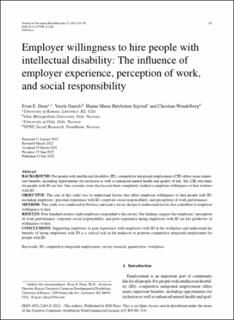| dc.contributor.author | Dean, Evan Edward | |
| dc.contributor.author | Garrels, Veerle | |
| dc.contributor.author | Sigstad, Hanne Marie Høybråten | |
| dc.contributor.author | Wendelborg, Christian | |
| dc.coverage.spatial | Norway | en_US |
| dc.date.accessioned | 2022-09-26T08:11:44Z | |
| dc.date.available | 2022-09-26T08:11:44Z | |
| dc.date.created | 2022-06-23T16:24:24Z | |
| dc.date.issued | 2022-07-15 | |
| dc.identifier.issn | 1052-2263 | |
| dc.identifier.issn | 1878-6316 | |
| dc.identifier.uri | https://hdl.handle.net/11250/3021187 | |
| dc.description.abstract | Background: For people with intellectual disability (ID), competitive integrated employment (CIE) offers many important benefits, including opportunities for inclusion as well as enhanced mental health and quality of life. Yet, CIE outcomes for people with ID are low. One systemic issue that has not been completely studied is employer willingness to hire workers with ID.
Objective: The aim of this study was to understand factors that effect employer willingness to hire people with ID, including employers’ personal experience with ID, corporate social responsibility, and perceptions of work performance.
Method: This study was conducted in Norway and used a survey design to understand factors that contribute to employer willingness to hire.
Results: Four hundred seventy-eight employers responded to the survey. Our findings suggest that employers’ perception of work performance, corporate social responsibility, and prior experience hiring employees with ID are key predictors of willingness to hire.
Conclusions: Supporting employers to gain experience with employees with ID in the workplace and understand the benefits of hiring employees with ID is a critical task in the endeavor to promote competitive integrated employment for people with ID. | en_US |
| dc.description.sponsorship | The project “Effective school-work transition processes for students with mild ID” was funded by the Norwegian Research Council (grant number 301510, date 10.12.2019). | en_US |
| dc.language.iso | eng | en_US |
| dc.publisher | IOS Press | en_US |
| dc.relation.ispartofseries | Journal of Vocational Rehabilitation;Volume 57, issue 1 | |
| dc.rights | Navngivelse-Ikkekommersiell 4.0 Internasjonal | * |
| dc.rights.uri | http://creativecommons.org/licenses/by-nc/4.0/deed.no | * |
| dc.subject | Intellectual disabilities | en_US |
| dc.subject | Intellectually disabled people | en_US |
| dc.subject | Competitive integrated employment | en_US |
| dc.subject | Survey research | en_US |
| dc.subject | Workplaces | en_US |
| dc.title | Employer willingness to hire people with intellectual disability: The influence of employer experience, perception of work, and social responsibility | en_US |
| dc.type | Peer reviewed | en_US |
| dc.type | Journal article | en_US |
| dc.description.version | publishedVersion | en_US |
| dc.rights.holder | © 2022 – The authors | en_US |
| cristin.ispublished | true | |
| cristin.fulltext | preprint | |
| cristin.qualitycode | 1 | |
| dc.identifier.doi | https://doi.org/10.3233/JVR-221201 | |
| dc.identifier.cristin | 2034638 | |
| dc.source.journal | Journal of Vocational Rehabilitation | en_US |
| dc.source.volume | 57 | en_US |
| dc.source.issue | 1 | en_US |
| dc.source.pagenumber | 85–95 | en_US |
| dc.relation.project | Norges forskningsråd: 301510 | en_US |

